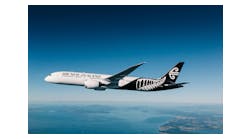Oct. 13--DALLAS -- Southwest Airlines is ready to celebrate its first minute of freedom from the Wright Amendment at Dallas Love Field, even though it's a year away.
The Dallas-based airline is unveiling a countdown clock today at its headquarters, reminding employees, passengers and North Texans that starting on Oct. 13, 2014, it will be able to fly nonstop anywhere in the U.S. from its Love Field home.
"We are going to start telling people exactly what this means, in terms of providing nonstop Love to the people of North Texas," Executive Vice President Ron Ricks said. "We want North Texas to be as excited about it as we are."
When the compromise agreement was signed in 2006, eight years seemed like a long time to wait for the travel restrictions to be lifted at Love Field. The long-negotiated delay was meant to give Dallas/Fort Worth Airport and its main tenant, American Airlines, time to prepare for the big change.
But in those eight years, the airline industry has changed dramatically as several carriers have merged -- including Southwest, which bought AirTran Airways. Both Love Field and DFW have also undertaken expensive terminal renovations to make traveling in and out of the Metroplex more customer-friendly.
As a result, industry analysts don't expect the end of Wright Amendment restrictions to dramatically affect air travel for travelers in the Metroplex, aside from new competition on selected routes.
"It's an opportunity for Southwest, but it's not a sea change in travel patterns in the Metroplex," aviation consultant Michael Boyd said.
Restrictions to be lifted
Since the enactment of the Wright Amendment in 1979, nonstop flights out of Love Field were limited to only a handful of states. Local politicians said the restrictions were put in place to maintain a financially healthy DFW Airport.
But in 2004, Southwest began a public campaign to change those restrictions, saying it was time to "set LUV free." DFW Airport and its supporters countered with a "keep DFW strong" campaign.
It took several months of negotiations among both airports, Southwest, American and the mayors of Dallas and Fort Worth to hammer out a compromise. In 2006, the deal was approved by Congress and signed into law by President George W. Bush.
"Lifting the Wright Amendment restrictions will only mean more choices for the traveling public, and that can only be a good thing," said Fort Worth Mayor Betsy Price, who was not mayor when the compromise was reached.
The agreement allows for long-haul flights out of Love Field starting in 2014, while limiting the airport to 20 gates and prohibiting international flights.
It also immediately permitted airlines, primarily Southwest, to begin selling tickets to connecting destinations outside of the Wright restrictions. For example, a consumer could buy a ticket to Los Angeles from Love Field that included a stop in Albuquerque.
Currently, nonstop flights can be offered from Love Field to cities in Texas, New Mexico, Oklahoma, Kansas, Arkansas, Louisiana, Mississippi, Missouri and Alabama. But with so-called through-ticketing, Southwest has been able to offer one-stop service to other destinations including Las Vegas, Chicago and Orlando, Fla., for several years.
With the restrictions dropping next year, those destinations could see nonstop service from Love Field.
"Dallas-Fort Worth needs and will support multiple airports," said Dallas Mayor Mike Rawlings, who was also not in office when the compromise was reached. "We are a big market and I think new travel options for Dallas-Fort Worth citizens is a very positive thing."
The effect for Southwest
Southwest has been waiting for years to fly long-haul flights out of Love Field. And now that it will have that ability, the airline is being coy about its plans.
"We're not sure what we're going to do yet because it depends on demand," Ricks said.
Since the compromise was reached, Southwest has added Boeing 737-800 aircraft which carry 175 passengers, 20 percent more than the Boeing 737-700s the airline has. The larger planes allow Southwest to add capacity at airports that are gate- or slot-constricted like Love Field. The airline has also added more seats to its older planes, increasing to 143 seats from 137 seats with its Evolve interior redesign.
And in the past four years, Southwest has added service to major business travel markets including LaGuardia Airport in New York, Reagan National Airport in Washington, D.C., and Logan Airport in Boston.
The carrier will likely unveil its new schedule for nonstop flights out of Love Field in the spring, as Southwest typically opens up its fall schedule for ticket purchases about six months ahead.
Industry analysts speculate that Southwest will reduce its daily flights from Love to Houston, Austin, Lubbock and other markets as it adds destinations. Southwest is likely to add flights to its hubs in Los Angeles, Denver, Las Vegas and Chicago's Midway airport, they say.
"They are going to want to connect Dallas to those larger markets they've entered like New York, Boston and Washington, D.C., which were outside of the Wright Amendment perimeter," said Bill Swelbar, an airline researcher at the Massachussetts Institute of Technology.
Newer airports, lower fares
Consumers can expect airfares to drop on the new long-haul routes that Southwest launches from Love, but most of the airfares in and out of the Metroplex are likely to remain unchanged.
"Historically, whenever we've seen new routes, typically you will see four to eight months of loss-leading promotions, and then the fares sort of stabilize," said Rick Seaney, co-founder of Farecompare.com. "The bottom line is it helps on certain routes, maybe a dozen or so, where you'll see lower prices."
On the nonstop routes that Southwest adds to Love Field, Seaney said, he expects leisure fares to decline about 30 percent. Business travelers who typically purchase tickets seven days in advance will probably see a 20 percent discount, he said.
Low-fare competitor Spirit Airlines has already helped reduce fares on some routes out of DFW as the carrier has increased service to 26 destinations in two years. Fort Worth-based American, which handles about 85 percent of the passenger traffic out of DFW, has also faced competition from Virgin America and JetBlue Airways, which have added service to DFW.
"The airline industry is extremely competitive, and the expiration of the Wright Amendment will only intensify the competition for customers across the country and in the Dallas-Fort Worth market," American spokeswoman Stacey Frantz said.
Both airports in the Metroplex are spending hundreds of millions to make their terminals more appealing to customers.
DFW Airport is in the midst of a $2.3 billion, eight-year terminal renovation. The first part of the remodeled Terminal A opened this year with new concessions, terrazzo floors and a new ticketing area for American.
"Our focus has been doing what we need to do to be a competitive airport, not just with Love Field but with other airports including those around the world," said Phil Ritter, DFW Airport's executive vice president of government and stakeholder affairs.
Love Field, which serves about 8 million passengers annually, has spent more than $500 million demolishing old concourses and redesigning its terminal. The first half of the renovation opened in April, giving travelers concessionaires like La Madeleine, Cru Wine Bar and Sky Canyon by chef Stephan Pyles. The airport also installed power outlets and USB connections at every seat in the gate for travelers who want to charge their laptops or phones while they wait in the departure area.
The last phase of the project, which includes gates used by United Airlines and Delta Air Lines and a new baggage claim area, will be ready in October 2014, just in time for the Wright Amendment restrictions to end.
"On Oct. 13, [2014], we will have guests to our new home so it was in our interest to spend the money to upgrade Love Field so people, when they came to our home, had a positive experience," Ricks said.
Analysts say it's a 'nonevent'
Despite years of political arguments over the Wright Amendment, now that the repeal date is close, industry analysts say it will only minimally affect the region.
"Basically, American has locked up DFW and Southwest has locked up Love Field and in that sense nothing is going to change," said Bud Weinstein, an economist at Southern Methodist University's Cox School of Business.
Weinstein, who was a vocal critic of the Wright Amendment, argued in 2004 that the best way to boost competition for consumers would be to tear down Love Field and force Southwest to move to DFW. When the Wright Amendment restrictions go away next year, he doesn't expect any new carriers to add service at Love since the industry has consolidated into fewer airlines.
Southwest has also grown its operations at other airports tremendously since the compromise was reached, leaving Love Field No. 8 among its top 10 airports by departures. Since Love Field will remain restricted on international service, the carrier has chosen to build its international operations out of Houston's Hobby Airport as part of a $150 million renovation project there.
And with Love Field limited to 20 gates, it has little room for expansion. Analysts say it will continue to be dwarfed by DFW Airport, which serves more than 60 million passengers annually.
"It's going to be a nonevent," Boyd said. "Love Field is a secondary airport for the Metroplex and it's always going to be."
Andrea Ahles, 817-390-7631 Twitter: @Sky_Talk
Copyright 2013 - Fort Worth Star-Telegram




